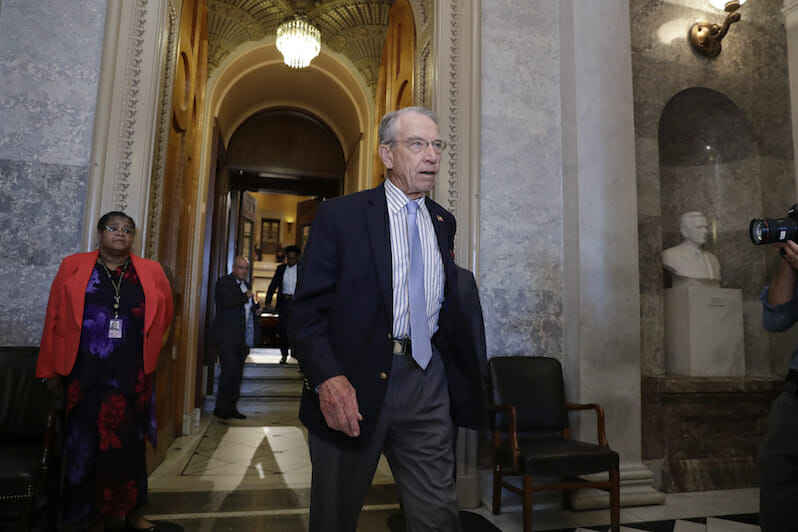Senate Republicans Fail to Pass Two of Three Obamacare Repeal Options
Tuesday's progress gives way to Wednesday's quagmire for Senate Republicans in their repeal-and-replace quest. (Pictured, Sen. Chuck Grassley, R-Iowa.) Senate Judiciary Committee Chairman Chuck Grassley, R-Iowa, at the Capitol in Washington, D.C., on Wednesday after the Senate rejected a GOP proposal to scuttle Obamacare.
(J. Scott Applewhite / AP)
Senate Judiciary Committee Chairman Chuck Grassley, R-Iowa, at the Capitol in Washington, D.C., on Wednesday after the Senate rejected a GOP proposal to scuttle Obamacare.
(J. Scott Applewhite / AP)
Senate Judiciary Committee Chairman Chuck Grassley, R-Iowa, at the Capitol in Washington, D.C., on Wednesday after the Senate rejected a GOP proposal to scuttle Obamacare. (J. Scott Applewhite / AP)
Although the Senate on Tuesday passed a motion to proceed with debate about repealing the Affordable Care Act, it has failed to subsequently pass two of three proposals to repeal and revise the current law. The debate continues to underscore how Senate Republicans, while vociferously opposed to the Affordable Care Act (ACA), do not agree on what should be in a repeal bill that would garner enough support to replace it.
The first of the failed motions was the effort to repeal the ACA and replace it with a revised version of the Republicans’ Better Care Reconciliation Act, which fell short on Tuesday evening of garnering the necessary votes. The bill needed 60 votes to overcome a parliamentary objection.
The second, a partial repeal, which tanked on Wednesday afternoon, would have pulled the coverage provisions in the Affordable Care Act, including the individual mandate and Medicaid expansion. The Congressional Budget Office estimates that this would have left 32 million Americans uninsured, the most of any of the Republican health care proposals.
Reports The New York Times:
The vote, 45-55, underscored the bind that Republican leaders have found themselves in. Seven Republicans voted against the measure — Senators Shelley Moore Capito of West Virginia, Susan Collins of Maine, Dean Heller of Nevada, John McCain of Arizona, Rob Portman of Ohio, Lamar Alexander of Tennessee and Lisa Murkowski of Alaska — showing that repealing the health law without an immediate replacement lacks crucial support among Republicans.
This still leaves what is known as the “skinny repeal” option on the table, which would eliminate some of the less popular parts of the Affordable Care Act without making changes to Medicaid. The New York Times elaborates:
This bill has not been scored by the C.B.O. yet, but in December, the budget office said that repealing the individual mandate would have substantial negative effects on the insurance market. Premiums would spike and the number of uninsured would rise.
…This option has features that could appeal to holdouts on both sides. It is softer on Medicaid, which could attract moderates. And it is a “clean” repeal of some Obamacare provisions, even if its scope is modest, which could attract conservatives. Other undecideds may be persuaded that a vote for the skinny-repeal option would be a way to keep the bill alive, so House and Senate negotiators can reach a final compromise later.
Medical insurance company Blue Cross Blue Shield released a statement on Wednesday arguing that repealing the ACA’s mandate that each individual have insurance could be disastrous without replacement by another measure that ensures that people are able to obtain and maintain coverage:
If there is no longer a requirement for everyone to purchase coverage, it is critical that any legislation include strong incentives for people to obtain health insurance and keep it year-round. A system that allows people to purchase coverage only when they need it drives up costs for everyone. Immediate funding for the cost-sharing reduction program also is essential to help those individuals most in need with their out-of-pocket costs, so they can access medical services. And dedicated funds must be provided to help pay for the care of those with significant medical conditions.
In order to ensure a stable individual insurance marketplace, any final legislation must include these crucial elements to avoid steep premium increases and diminished choices that would make coverage unaffordable and inaccessible.
Republican leaders believe that the “skinny repeal” option may be the only measure that can get through the Senate. They are currently limited to 20 hours of debate (without filibuster from the Democrats), as they are using special budget rules to try to pass a repeal bill.
Your support matters…Independent journalism is under threat and overshadowed by heavily funded mainstream media.
You can help level the playing field. Become a member.
Your tax-deductible contribution keeps us digging beneath the headlines to give you thought-provoking, investigative reporting and analysis that unearths what's really happening- without compromise.
Give today to support our courageous, independent journalists.









You need to be a supporter to comment.
There are currently no responses to this article.
Be the first to respond.